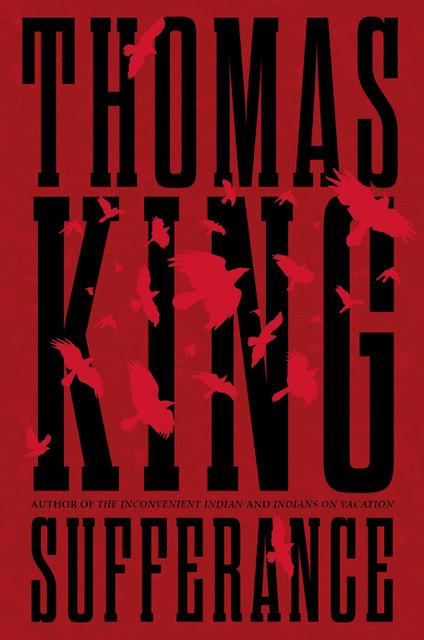
Jeremiah Camp does not speak.
At all.
For the entire book.
The protagonist of Thomas King’s novel, Sufferance, has no TV, phone, internet, or mailbox. He likes it that way.
Jeremiah lives on the fictional Cradle Rock Reserve, located somewhere in Ontario, as the owner and only inhabitant of a former residential school. Built in 1903, the school was run by the Catholic Church until 1965 when it was closed, abandoned, and over time destroyed by fire except for the main building where Jeremiah lives.
During its final 36 years of operation, the resident priest in charge kept a detailed record of the school’s cemetery. He created a map with the location of each child’s grave and the name of the former student. Jeremiah has given himself the task of replacing the worn-out, decomposing crosses of the 77 children. Methodically he pulls up the crosses, throwing them in a pile to be burned later, and carrying flat stones from the nearby riverbed, he chisels each stone with the full name of the child buried at the foot of their cross.
He places the finished stone flat in the ground. Occasionally the ghost of the buried child appears to him as he works and then disappears. Or he thinks they do.
When the story begins, Jeremiah has only the company of an unnamed ginger cat who comes and goes, and a hover of crows that observes him as he goes about his life.
Jeremiah has blood ties to the band but is not of the community. His mother, Ruby, left when she was pregnant, and Jeremiah did not return until his adulthood.
Though Jeremiah does not speak, the author provides his thoughts for the reader. Jeremiah would like for his life to be simple, but he is as worldly as he is reclusive. His observations reveal a depth of knowledge of the world and all that is in it.
The Cradle Rock Reserve is next door to the town of Gleaming, separated only by an old riverbed. As band member Ada Stillday said, “If the houses don’t have wheels and you got concrete under feet, you’re in town. And if you’re standing on dirt in the middle of a beat-to-shit trailer park, you’re on the reserve.”
Tension between the Indigenous Peoples and the town folk is a running theme of the book. The ambitious mayor of Gleaming has development plans that involve the land held by the band. Mayor Loomis is also the real estate agent — a dangerous combination when treaty land is in the conversation. Loomis says to Jeremiah who he calls Jerry, “That land claim is never going to see the light of day. It’s been what? Seventy? Seventy-five years? And cemeteries can be moved.”
Also present are the neighbours, a small group of homeless non-Indigenous families who in the 70s would have been called hippies. They have been living in the abandoned box inkfactory. No one in the community knows what to do with them or where they belong. As Nutty Moosenee, an Elder of the community says, “Don’t think they are hippies. They’re just poor. Like us.”
Everyday Jeremiah walks into Gleaming and buys two brownies (if they are available) from Swannie Gagnon, the baker, notorious for her hairy underarms. He takes the brownies to a former bank now converted into The Piggy Bank restaurant, known locally as the Piggy. He is given an espresso macchiato and shares the brownies with Florence who owns the building. The sign out front says the restaurant is closed but it functions as a community gathering place by invitation only. Over coffee and espresso, Florence announces to whoever is present the important news of the day which she calls news, blues and comfortable shoes:
“In Texas, police have exonerated themselves in the shooting death of a woman who was killed as she was getting her baby ready for bed. Woman was Black. Cops were White. I’m guessing the baby was packing a semi-automatic rattle.”
Jeremiah is not seeking community but somehow community has found him.
Each of the people Jeremiah meets on his morning rounds fills in the blanks of his silence in the conversations they carry on with what they anticipate he might say. They treat him with acceptance appearing not to notice that he has said nothing. They question one another about Jeremiah and wonder why he came back. How could he afford to buy the residential school? Was it even for sale?
Florence warns Jeremiah, “That old school ain’t going to protect you. You can close the windows, lock the doors, and the world is still going to come calling.”
Jeremiah knows it already has. He spotted the black SUV with tinted windows parked across the square, which belongs to Oliver Flood. The reader is introduced to this representative of the Locken Group, a multinational corporation where Jeremiah once worked, and where he was known as Forecaster. Whatever work he was doing for them before, they want him back to do again.
Sufferance: A Novel takes off as a mystery and political thriller. King writes of deep and troubling social and economic issues, gracing them with the light touch of his brand of sly humour, an intentional balance to the darker aspects of the story:
In response to a question regarding his use of humour on CBC Magic 8 Q & A, King said “I suspect that most people see humour and tragedy as polar opposites, while, for me, any serious writing has to have elements of comedy to help alleviate the sorrow and, more importantly, to sharpen the tragedy.”
In a January 2021 interview, conducted by CBC journalist Shelagh Rogers at FOLD (Festival of Literary Diversity), King said he chose the name Jeremiah specifically for its biblical connotation. Known as the weeping prophet and recognized by the Jewish, Muslim, and Christian faiths, Jeremiah tried to warn people they were going astray:
Therefore, thus saith the Lord, behold, I will bring evil upon them, which they shall not be able to escape; and though they shall cry unto me, I will not harken to them. Jeremiah 11:11
King’s Jeremiah knows what is going to happen but does not see the point in telling anyone. He is silent. Through his character’s silence, King deals with issues of race and racism, colonization, and Indigenous people versus settlers. Through the microcosm of Gleaming and Cradle Rock, he considers the ways community forms and the ways it does not.
Economic disparity is a big issue in Sufferance. King is bothered by what he referred to in the interview with Rogers as the “three comma club,” – billionaires and the ways they choose to use their fortunes. Think Sir Richard Branson and Jeff Bezos in their separate flights into space, spending untold amounts of money for 10 minutes of weightlessness.
As King said to Rogers, “With all they could do, you do this? I object to people who hoard money, food, land.”
Two of King’s characters utter the sentence, “All of us exist at the sufferance of others.”
Hence the name of his novel, and for King, a reality, “No matter where you are in the socio-economic scheme, that is the truism.”
Though dealing with weighty truths, this highly recommended novel is a quick and entertaining read, one that will not leave the reader after the last page.
Pub Date: 2021
ISBN: 9781443463102
Page Count: 306
Publisher: HarperCollins Publishers Ltd
Image: HarperCollins Canada
